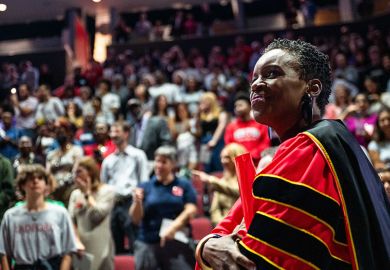Australia’s universities are right to call for “greater financial certainty and clarity” from the country’s government, according to experts, as speculation grows that higher education could face cuts to public funding.
Barney Glover, the chair of Universities Australia, attacked the government’s policy approach in a speech on 9 March ahead of the organisation’s conference.
His comments follow the government’s decision to shelve a plan to deregulate fees after it ran into opposition in the Senate – although the Liberal Party that leads the government may return to the plan in its manifesto for the country’s general election, which could be held as early as July.
Professor Glover, vice-chancellor of Western Sydney University, said in his speech: “Almost two years of policy insecurity and uncertainty is taking its toll on the ability of universities to plan and allocate resources in their students’ best interests. It is difficult to imagine any other industry tolerating such policy instability.”
Hamish Coates, professor of higher education at the University of Melbourne, told Times Higher Education that the sector was in “a really uncertain, limbo phase”.
He said: “It’s almost certainly the case that the free market won’t work in higher education. But it’s almost certainly the case at the other end that a tightly regulated supply doesn’t work either – it’s just too hard to predict workforce needs…it’s not transparent and it’s not the most efficient way of going about things.”
Professor Coates noted that in terms of overseas competition, Australia is “in an enormously dynamic region in which private [funded] higher education has been the modus operandi for all the governments…China, Malaysia, Singapore, Japan, Korea”.
He warned that in terms of funding, the “sector needs greater financial certainty and clarity so it can plan how to go about generating new forms [of delivery and qualifications]”.
At the UA conference, education minister Simon Birmingham made a speech pledging to ensure that “the next time we seek support of the Senate for reforms, they are not only generally supported amongst UA or vice-chancellors, but that the reasons for reform are more broadly well appreciated, the vision well enunciated and the implications well understood”.
He also said in relation to funding: “We need to reconsider the balance between public and private contributions versus public and private benefits.”
Andrew Norton, higher education programme manager at the Grattan Institute thinktank, said he thought that Mr Birmingham’s comments “confirmed that the May Budget will include another attempt to reduce [the government’s] per student…contributions”.
Although Mr Norton said that the measure was “unlikely to pass the current Senate”, he highlighted the government’s plans to change the Senate voting system.
“If the government wins the election it is possible, although not likely, that they will have a Senate that might pass cuts,” he said.
“Universities would be compensated for any lost revenue by increases in student contributions,” he added, either via fee deregulation or fee increases within regulated caps.
But Mr Norton continued: “While I understand UA’s problems with the higher education reform process, the most likely outcome on per student funding rates is the status quo, or some minor variation on the status quo.
“That is Labor’s policy, and if the Liberals cannot get reforms through the Senate it is by default their policy too. Australian universities know how to deal with the status quo.”
Register to continue
Why register?
- Registration is free and only takes a moment
- Once registered, you can read 3 articles a month
- Sign up for our newsletter
Subscribe
Or subscribe for unlimited access to:
- Unlimited access to news, views, insights & reviews
- Digital editions
- Digital access to THE’s university and college rankings analysis
Already registered or a current subscriber? Login







